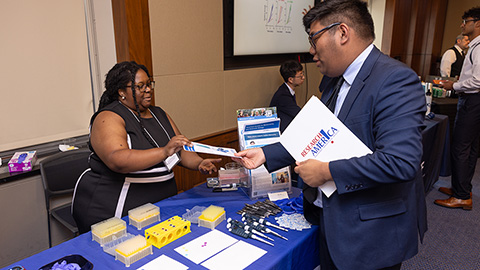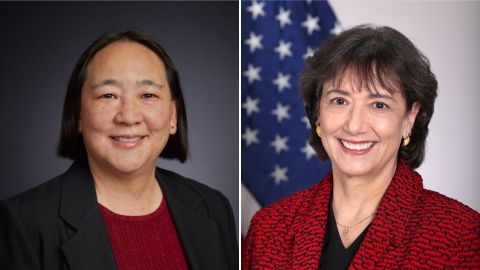ASBMB convenes panel to discuss how Congress can address sexual harassment in science
The American Society for Biochemistry and Molecular Biology hosted a congressional briefing Dec. 6 to discuss the U.S. Congress’s role in addressing sexual harassment and misconduct in science.
University of Illinois professor Kathryn Clancy, Nobel laureate Carol Greider and Andrew Black of the American Association for the Advancement of Science discussed policies and legislation in front of an audience of congressional staffers and representatives of scientific societies.
 Panelists Kathryn Clancy, Andrew Black, and Carol Greider, with moderator Benjamin Corb.
Panelists Kathryn Clancy, Andrew Black, and Carol Greider, with moderator Benjamin Corb.
Clancy, a member of the National Academies of Science’s committee on sexual harassment in academia, said there are few protections for scientists doing research.
Like other researchers doing human subject research, Clancy must tell review boards how her subjects will be protected. However, “I don’t have to prove in any way that I am taking the safety of my own research personnel seriously,” she said.
Clancy urged legislators to protect complainants from retaliation by their harassers.
“Reporting is not the only solution,” she said, “but in those moments when folks are coming forward … we really need to be thinking about what we can do to protect them from the anticipatory retaliation.”
When asked what is needed to combat sexual harassment, Clancy noted the lack of research on best practices to mitigate harassment in the workplace.
“We need to increase the funding for climate surveys and do a better job measuring progress as we start to implement some of these changes,” she said.
Clancy’s recommendations stem from the National Academies’ sexual harassment of women in STEM report, of which she was a contributing author.
Greider, an ASBMB member and outspoken activist on sexual and gender misconduct, warned about Education Secretary Betsy Devos’ attempts to weaken Title IX, the law that prevents discrimination on the basis of sex in any federally funded institution.
A feature article about sexual harassment in science published in ASBMB Today describes Title IX and the challenges of enforcing it.
While acknowledging that the law is imperfect, Greider said, “Don’t break Title IX.”
Greider also spoke about the need to make sexual harassment findings at universities more public.
“Try to remove legal obstacles that cause silence about the investigation,” she said. “Without being able to talk about the outcomes, if there’s an investigation … and there’s a finding, nothing is said and the [harasser] disappears. There has to be some way to allow dissemination about what happened to these people.”

Andrew Black, chief of staff and external affairs officer at AAAS, said his organization hosted a consortium that brought together scientific societies, including the ASBMB, to discuss how they can work together on sexual harassment.
AAAS is also working on an initiative to reward research institutes that are making efforts to improve diversity and inclusion.
“Earlier this year we launched an exciting new mission called SEA Change, ‘SEA’ standing for ‘STEM equity achievement,’” he said. “What we really need to focus on is digging deep on cultural and institutional change. SEA Change supports this change.”
When asked about current legislation, Black pointed to H.R. 7031, the Combatting Sexual Harassment in Science Act of 2018 sponsored by Rep. Eddie Bernice Johnson, D-Texas. The bill would provide funding to study the effects of sexual harassment in STEM and look at policies to reduce harassment.
While H.R. 7031 would address one of Clancy’s recommendations, she said federal science agencies have a role to play in changing the culture of science. And she noted the disparity among federal science agencies’ handling of sexual harassment in science.
The ASBMB applauded the National Science Foundation’s proposed rule changes in May regarding sexual harassment and has recently urged the National Institutes of Health to develop more stringent policies to address sexual harassment at institutions funded by the agency.
Clancy highlighted the need for funding agencies to create better reporting mechanisms and enforce sanctions on scientists found guilty of harassment.
“This is something that the NSF has been fairly aggressively pursuing,” Clancy said, “and it’s worth asking why other federal funding agencies have not been pursuing this as aggressively.”
She addressed the audience directly.
“It would be great for legislative bodies to encourage them to do so.”

Enjoy reading ASBMB Today?
Become a member to receive the print edition four times a year and the digital edition monthly.
Learn moreGet the latest from ASBMB Today
Enter your email address, and we’ll send you a weekly email with recent articles, interviews and more.
Latest in Policy
Policy highlights or most popular articles

ASBMB honors Lawrence Tabak with public service award
He will deliver prerecorded remarks at the 2025 ASBMB Annual Meeting in Chicago.

Summer internships in an unpredictable funding environment
With the National Institutes of Health and other institutions canceling summer programs, many students are left scrambling for alternatives. If your program has been canceled or delayed, consider applying for other opportunities or taking a course.

Black excellence in biotech: Shaping the future of an industry
This Black History Month, we highlight the impact of DEI initiatives, trailblazing scientists and industry leaders working to create a more inclusive and scientific community. Discover how you can be part of the movement.

ASBMB releases statement on sustaining U.S. scientific leadership
The society encourages the executive and legislative branches of the U.S. government to continue their support of the nation’s leadership in science.

ASBMB and advocacy: What we accomplished in 2024
PAAC members met with policymakers to advocate for basic scientific research, connected some fellow members with funding opportunities and trained others to advocate for science.

‘Our work is about science transforming people’s lives’
Ann West, chair of the ASBMB Public Affairs Advisory Committee, sits down Monica Bertagnolli, director of the National Institutes of Health.

